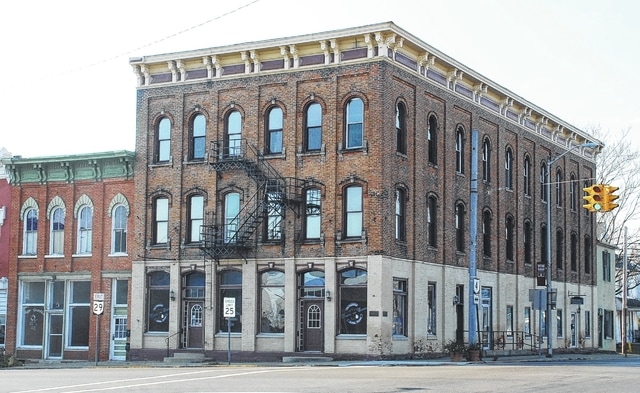
MECHANICSBURG – As the second oldest municipality in Champaign County, the village is home to many historic and aging structures, some of which are starting to deteriorate into a state of disrepair. In an attempt to give these buildings a fighting chance to withstand the test of time when they are left vacant by their owners, Village Council is moving forward with a supplement to the village’s zoning ordinance – the Vacant Building Maintenance Enforcement Program (Section 592).
Scheduled to be voted upon during council’s 6:30 p.m. meeting on Monday, Nov. 21, in the municipal building, the measure seeking to establish the new section in the Mechanicsburg Village Zoning Ordinance was developed by council as a way to establish standards for maintenance and upkeep of vacant structures.
“Mechanicsburg has a wonderful history and amazing styles of architecture throughout,” Zoning Officer Dusty Hurst said. “While we have some beautifully-kept homes and some very well-maintained buildings downtown, we also have quite a few that are deteriorating quickly.
“When a structure sits vacant, it deteriorates very quickly, and unfortunately, we see that happening to some very prominent structures. Most of these structures haven’t just sat for short periods of time. They are ongoing, and we see absolutely no progress. We have already lost a few buildings that were too far gone due to this scenario, and a few more are close behind if something doesn’t happen soon,” he added.
The drafting of the Vacant Building Maintenance Enforcement Program stemmed not only from council’s desire to prevent the loss of historic structures ranging from downtown buildings to residential homes, but also as a way for village officials to address the future of Mechanicsburg in terms of funding and bringing in new businesses and residents.
“I see a need for a program like this to help with infrastructure and economic development within the village, and truthfully, the survival of any small town or village,” Hurst said. “Properties that are sitting vacant and in need of repair directly affect the surrounding properties and with that, the village as a whole.
“A decline in property value means a decline in tax revenue, which is very important in the survival of any small town. A program like this will help open some communication on the intentions of the property’s future and will hopefully help push some progress to benefit both the property owner and the village,” he added.
Program details
If passed after a third and final reading on Monday, the new chapter to the village’s zoning ordinance will establish a program for identifying and registering vacant buildings, define the responsibilities of owners of vacant buildings, and provide incentives to speed the rehabilitation and productive use of vacant buildings.
“Quite simply, it all boils down to pride of ownership and preventing small repairs from becoming much larger issues,” Hurst said. “One may argue that they do not have the funds or means to make the necessary repairs or updates to the property, but there are resources out there as far as possible grants, tax incentives…etc.
“If all else fails, then perhaps it would be best to sell the property to someone who is able to do what is needed before the property is in further deterioration,” he added.
For the purpose of the maintenance enforcement program, a vacant building is defined as a structure which meets one of the following criteria: unoccupied and unsecured; unoccupied and secured by other than normal means; unoccupied and an unsafe building as determined by the zoning inspector or his duly designated representative; unoccupied and having utilities disconnected; unoccupied and has housing or building code violations; illegally occupied; unoccupied for a period of time over 90 days and having an existing code violation; unoccupied with a mortgage status of abandonment; or unoccupied and abandoned by the property owner.
If a structures meets the vacant building definition, the program would require the owner to register the structure (forms available at the municipal building) with the village administrator no later than 90 days after it becomes vacant or no later than 30 days after being notified by the zoning inspector (or a duly designated representative) of the requirement to register based on evidence of vacancy.
As part of the registration process, the owner of the vacant structure would also be required to submit a vacant building plan, which must detail one of the following: a demolition plan if the building is to be demolished; a plan for ensuring the building is secured if the structure is to remain vacant; or a rehabilitation plan for the property if the building is to be returned to use or occupancy.
Fees, penalties
If the proposed Vacant Building Maintenance Enforcement Program is approved by council, the village’s zoning inspector will conduct an exterior inspection at least twice per year on vacant buildings to ensure compliance.
Being that the proposed ordinance states the intended result of the proposed chapter is to shift the cost or burden of the existence of vacant structures from the general citizenry to the owners of the buildings, a fee would be levied against owners of buildings deemed vacant.
The measure calls for the owner to pay a $200 fee for the first year the building remains vacant, and for every consecutive year the building remains vacant, an annual fee will be assessed at double the previous year’s fee. The maximum annual fee would be capped out at $3,200.
As for enforcing the proposed program, anyone found to be in violation would be guilty of a fourth-degree misdemeanor upon first offense, a third-degree misdemeanor upon a second offense, and a second-degree misdemeanor upon a third offense.
“My hope is that this ordinance will give some push to the property owners to do the necessary repairs and updates to their structures to help sustain the village economically as well as visually,” Hurst said.


